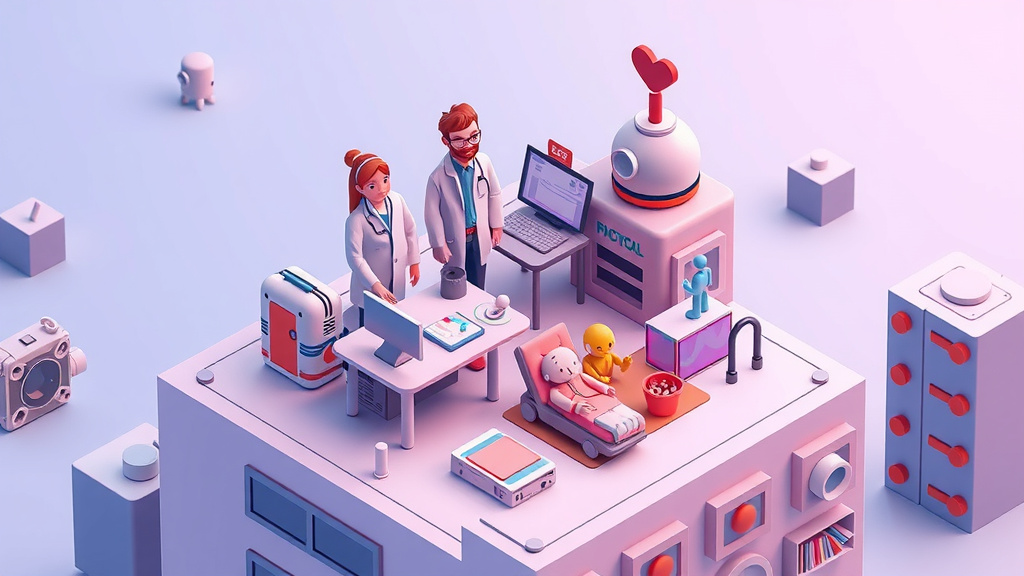The intersection of artificial intelligence (AI) and various industries is rapidly evolving, with significant advancements in healthcare, life sciences, and technology. Recent news highlights the growing importance of AI in these sectors, from improving patient care to revolutionizing the way we interact with the web.
Microsoft's AI Assistant for Healthcare
Microsoft has developed an AI system, Dragon Copilot, designed to assist healthcare professionals in clinical settings. The system combines voice-dictation and ambient listening technology to streamline documentation and automate tasks, freeing clinicians from administrative burdens. Microsoft's surveys found that clinicians who used the Nuance tech that makes up Dragon Copilot suffered less burnout, and 93% of their patients reported a better overall experience.
Cloud-First, AI-Powered Strategies in Healthcare
Provider organizations that invest in cloud-first, AI-powered strategies will thrive, according to Patty Hayward, general manager of healthcare and life sciences at Talkdesk. She emphasizes the importance of embracing innovation to remain sustainable in today's uncertain environment. Cloud-based AI systems can drive efficiency across patient access, revenue cycle, and contact center operations, areas that can have a massive financial and operational impact when modernized.
AI in Leave Management
AI-driven tools like PaidLeave.ai promise to cut through bureaucracy and confusion in employee benefits, offering quick, clear answers when employees need them most. While AI has the potential to eliminate human bias and reduce administrative headaches, it cannot fully capture the emotional nuances of a caregiver's life. AI should empower employees, not replace the human touch that makes workplace policies genuinely supportive.
Agentic AI Browser
Opera has unveiled a new update, Browser Operator, that automates tasks for users. The browser uses agentic AI to integrate directly into the browsing flow, allowing users to explain what they need it to do in natural language. For example, users can ask it to buy a 10-pack of size 12 white tennis socks from Nike, and it will handle the transaction.
Google's AI Model for Wildlife Identification
Google has released SpeciesNet, an AI model designed to identify animal species by analyzing photos from camera traps. The model was trained on over 65 million publicly available images and images from organizations like the Smithsonian Conservation Biology Institute. SpeciesNet can classify images into one of more than 2,000 labels, covering animal species, taxa, and non-animal objects.
AI in Healthcare and Life Sciences
A survey shows how AI is reshaping healthcare and life sciences, from research and discovery to patient care and administrative tasks. AI can automate repetitive tasks, aid in drug discovery, and offer assistance to patients through chatbots and AI assistants. The survey revealed robust AI adoption in the industry, with about two-thirds of respondents saying their companies are actively using the technology.
General Motors Hires First-Ever AI Chief
General Motors has hired Barak Turovsky as its first-ever artificial intelligence chief. Turovsky has more than 25 years of AI experience, most recently serving as vice president of AI at Cisco. He will work out of GM's Mountain View Technical Center in California, setting the vision and strategy for AI at GM and how it impacts everything from autonomous vehicle technology to enterprise logistics to manufacturing.
AI Startup Anthropic Valued at $61.5B
Anthropic said it raised $3.5 billion in its latest funding round, giving the Amazon- and Google-backed AI startup a $61.5 billion post-money valuation. The news comes a week after Anthropic announced Claude 3.7 Sonnet, its most intelligent model to date and the first hybrid reasoning model on the market.
Key Takeaways
- AI is transforming various industries, from healthcare to life sciences and technology.
- Microsoft's Dragon Copilot AI system is designed to assist healthcare professionals in clinical settings.
- Cloud-first, AI-powered strategies will thrive in healthcare, driving efficiency across patient access, revenue cycle, and contact center operations.
- AI-driven tools like PaidLeave.ai promise to cut through bureaucracy and confusion in employee benefits.
- Opera's agentic AI browser, Browser Operator, automates tasks for users.
- Google's SpeciesNet AI model identifies animal species by analyzing photos from camera traps.
- AI is reshaping healthcare and life sciences, from research and discovery to patient care and administrative tasks.
- General Motors has hired its first-ever AI chief, Barak Turovsky.
- AI startup Anthropic has raised $3.5 billion in its latest funding round, valuing the company at $61.5 billion.
Sources
- Microsoft’s new Dragon Copilot is an AI assistant for healthcare
- Provider organizations that invest in cloud-first, AI-powered
- Should We Trust AI To Manage Something As Personal As Family Leave?
- A.I. Start-Up Anthropic Closes Deal That Values It at $61.5 Billion
- Opera's Agentic AI Browser Will Do Your Shopping For you
- Google releases SpeciesNet, an AI model designed to identify wildlife
- Survey Shows How AI Is Reshaping Healthcare and Life Sciences, From Lab to Bedside
- GM hires first-ever artificial intelligence chief
- AI Startup Anthropic Valued at $61.5B After Latest Funding Round
